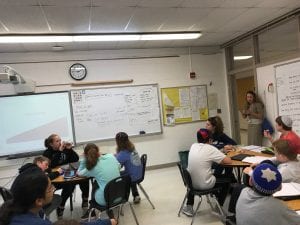Antisemitism: a word that has been on the forefront of all of our minds this week. Do our students know what this word means? Can they demonstrate the ability to explain where it comes from? How to use this word? When to use it?
Ask your student to explain this word to you. In eighth grade, we have covered racism and we are finishing our mini-unit on antisemitism. By Monday, students should be well-versed in discussing this word thoughtfully and sensitively.
In connection with our unit, Gev. Milbeck came in to Jewish Studies class to discuss the antisemitism that she faced in the former Soviet Union. She provided different, personal examples of how antisemitism can affect Jews even in hidden ways, such as not allowing Jews to study in university. Thank you to Gev. Milbeck for sharing her story so that our students start to understand the concept of antisemitism.
Dear Students,
Welcome and Bruchim Ha’baim. You are about to begin a unit about the Holocaust. It is based on a national curriculum called The Holocaust and Human Behavior and has been adapted from the organization Facing History and Ourselves. You are joining a community of tens of thousands of students from around the world who have explored the same questions you are about to explore—questions such as: Who am I? What shapes my identity? Why do people form groups? What does it mean to belong? What happens when people are excluded from membership?
After taking part in a unit similar to the one you are about to study, one student said, “I’ve had 13 math classes, 20 English classes, 6 or 7 science classes, art, P.E., Spanish…but in all the time I’ve been in school, I’ve had only one class about being more human.” In the next few weeks, you will be learning a lot about the choices made by people living in Germany before and during the Holocaust, a tragic event in which millions of children, women, and men were murdered. At the same time, you will also be learning about yourselves and the world around you. That is what we mean by “Facing History and Ourselves.” As another former Facing History student explained, “When I took the Facing History course back in eighth grade, it helped me understand that history was a part of me and that I was a part of history. If I understood why people made the choices they did, I could better understand how I make choices and hopefully make the right ones.”
This unit may be different from others you have experienced. In this unit, you will be asked to share your own ideas and questions, in discussions and through writing in a journal. You will be asked to listen carefully to the voices of others—the voices of people in your classroom community as well as the voices of people in the history you are studying. In this unit, you may hear things that spark powerful emotions, such as anger or sadness. You will be asked to use both your head and your heart to make sense of the choices people have made in the past and the choices people continue to make today.
As Jews we are even more responsible for understanding this history as it is OUR history or OUR peoples’ history. Some of us have relatives who experienced the Holocaust or relatives who were murdered during that time period. This unit demands the utmost of kavod (respect) and I will expect that from each and every one of you.
Learning about the Holocaust is a culminating experience along your MJDS Jewish Journey, along with the bike trip and the Israel trip. When taking this journey, you need to bring your journal, your curiosity, an open mind, and a willingness to share. As you embark on and continue this journey, it is important for you to support each other so that everyone can do their best learning. It is my hope that this experience will change you and me, and make all of us better people.
This unit is dedicated to all of the Jewish children who were murdered in the Shoah. It is our job to honor their memory by learning about the Shoah and making choices that will prevent this from happening again.
Bivracha, Gev Honigman
